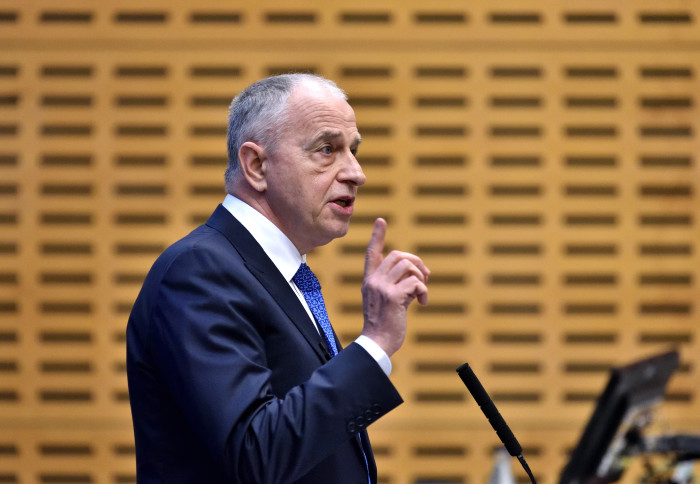NATO Deputy Secretary General discusses global security in ISST annual lecture

Mircea Geoana speaks at the Institute for Security Science and Technology's annual lecture. Photo credit: Jo Mieszkowski.
In an impassioned lecture, Mircea Geoana spoke of disruptive technologies and how NATO is responding to innovation challenges.
Ambassador Geoana spoke to a packed theatre at the annual lecture of the Institute of Security Science and Technology (ISST).
Against the backdrop of conflict in Ukraine, a world emerging from a global pandemic, and recent calls for a moratorium on generative AI, Ambassador Geoana’s speech unpacked how disruptive technology was impacting global security.
The event followed the opening of a new NATO innovation headquarters in Imperial’s White City campus earlier in the day, a key pillar of NATOs innovation agenda which was a core theme in the lecture.
The event was introduced by ISST Senior Security Science Fellow Professor Washington Yotto Ochieng and Imperial President Professor Hugh Brady.
“Unique moment in history”
Ambassador Geoana highlighted nine disruptive technology domains where NATO was focused, including AI, Autonomy, Biotech, Quantum, Energy, Propulsion, and Space.
He described this as being a “unique moment in history” due to disruptive technologies developing at pace, but led by industry and start-ups innovating on a rapid timescale, rather than governments.
These emerging and disruptive technologies have the potential to solve some of humanity’s most intractable problems, from climate change, to curing diseases.
However, he also cautioned that these dual-use technologies can cause great harm.
“…in a world where potential adversaries are already attempting to shut down networks and critical infrastructure at the click of a button, or sow discontent and disinformation through social media to destabilise our societies, we need to think differently about our use and how we use these technologies and how we keep our people and nations safe, and protect our freedom, protect human dignity, protect who we are as human beings. This is what NATO is doing.”
Global competitors
The NATO Deputy Secretary General commented on the increased friction in geopolitics.
The rise of global competitors presents massive opportunities and also challenges, especially when it comes to new technologies, where other nations have different policy and ethical frameworks to NATO countries.
The challenge lies in the dual-use nature of many of these disruptive technologies.
Whilst providing fertile ground for economic growth and positive competition, they also provide tools to further political and military aims, often through coercive means.
A battle of ideas, fuelled by technology
Ambassador Geoana spoke of a “battle of ideas” to define global norms, saying that this competition is as old as human society, with a modern difference:
“…never before have we witnessed the overlap between rising global competition, and the breathtaking technological developments on such scope and scale. So technology is supercharging the battle of ideas itself. The question is, will it save democracy, or further fracture it.”
Speaking passionately about the war in Ukraine, Ambassador Geoana said that the outcome of the war will have repercussion beyond the future of Ukraine, and will define the norms for global affairs and global security for decades.
This is why NATO is committed to supporting Ukraine’s right to self-defence.
Ambassador Geoana referenced his first-hand experience of growing up under a communist regime in his native Romania, then a part of the Union of Soviet Socialist Republics (USSR). This experience led him to be a strong believer in democracy, whilst being cognizant of its imperfections.
“Free and open societies allow talent to thrive, people to create, and finance to flow freely. There is a direct link between freedom and innovation. There is a direct link between innovation and freedom.”
Watch the full lecture at the top of the page or on YouTube here.
Article text (excluding photos or graphics) © Imperial College London.
Photos and graphics subject to third party copyright used with permission or © Imperial College London.
Reporter
Max Swinscow-Hall
Institute for Security Science & Technology
